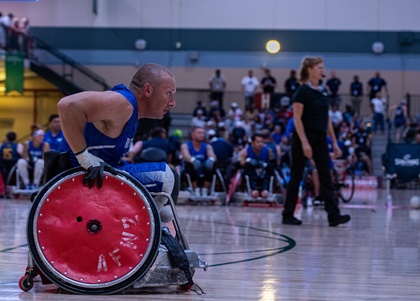By Stuart M. Campbell PT, MPT
May 9, 2023

U.S. Air Force photo by Airman 1st Class Erin Currie
In 2003, the Department of Defense began the development of the first of three Advanced Rehabilitation Centers at Walter Reed Army Medical Center in preparation for the expected casualties from Operation Enduring Freedom in Afghanistan. Two more ARCs were developed in the subsequent years: one at Brooke Army Medical Center in Fort Sam Houston, Texas, and the other at Naval Medical Center San Diego. The primary mission of the ARCs was to provide rehabilitative care for service members returning from the combat theaters with severe or critical extremity trauma and amputation. Specialty centers for this population have been used in previous conflicts such as World War I, World War II, and Vietnam. Lessons learned from prior wars were used to develop the staffing model for the new ARCs.
All three centers were designed around the concept of a robust multidisciplinary team approach to treating these complex patients. It was recognized that a holistic approach to care was required to maximize the rehabilitation and reintegration of these injured service members. Wald and Alvaro1 were cited by Jo, et al2 stating that “A multidisciplinary approach centered on patients and their caregivers is ideal for comprehensive rehabilitation and biopsychosocial management.”
Behavioral health clinicians have been an important part of the multidisciplinary team. The prevalence of pain, posttraumatic stress disorder, and depression in patients with extremity trauma and amputation is well documented.3,4 Behavioral health clinicians at the DOD ARCs are instrumental in ensuring that a truly holistic approach to patient management is taken with this population. The behavioral health teams at the ARCs use a variety of treatment modalities to address the psychological concerns of this population: virtual reality for pain management, mirror therapy for phantom limb pain, and cognitive-behavioral therapy to name a few. A recent article in Psychological Medicine described the post-traumatic growth experienced by injured service members in the United Kingdom that experienced similar injuries to U.S. service members in Afghanistan and were treated by a multidisciplinary team.5
Today, the DOD has the Military Advanced Training Center at Walter Reed National Military Medical Center, the Center for the Intrepid at Brooke Army Medical Center and the Comprehensive Complex Casualty Care Center at Naval Medical Center San Diego. The three ARCs continue to serve injured service members and their families. The level and types of psychological support has matured and grown. The ARCs provide service member and family support through traditional means such as psychiatrists, psychologists, social workers, and chaplains. But the ARCs also offer a variety of other services and programs that recognize the need for a multifaceted approach to support psychological health.
The ARCs have recreational therapy and adaptive sports programs to encourage injured individuals to engage in activities outside of the health care facility.6 There are programs in art and music available. The ARCs have also partnered with the Department of Veteran Affairs for vocational rehabilitation and the Amputee Coalition for a certified peer visitor program The Department of Defense, through the ARCs, has developed and continues to grow the support structure needed to ensure optimal psychological health for individuals with extremity trauma and amputation.
References
- Keszler, M.S., Wright, K.S., Miranda, A., Hopkins, M.S.. (2020). Multidisciplinary amputation team management of individuals with limb loss. Curr Phys Med Rehabil Rep. 8:118–26
- Jo, S.H., Kang, S.H., Seo, W.S., Koo, B.H., Kim, H.G., Yun, S.H. (2021). Psychiatric Understanding and Treatment of Patients with Amputations. Yeungnam Univ J Med. 38(3): 194-201
- Baby, S., Chaudhury, S., Walia, T.S.. (2018). Evaluation of treatment of psychiatric morbidity among limb amputees. Ind Psychiatry J. 27(2):240-248. doi: 10.4103/ipj.ipj_69_18. PMID: 31359979; PMCID: PMC6592204
- Hogan, W.B., Anderson, G., Kovoor, M., Alsoof, D., McDonald, C.L., Zhang, A.S., Kuris, E.O., Johnson, J.P., Daniels, A.H.. (2022). Phantom limb syndrome: Assessment of psychiatric and medical comorbidities associated with Phantom pain in 44,028 below knee amputees. Injury. 53(11):3697-3701. doi: 10.1016/j.injury.2022.09.018. Epub 2022 Sep 13. PMID: 36163201.
- Dyball, D., Bennett, A.N., Schofield, S., Cullinan, P., Boos, C.J., Bull, A.M.J., Stevelink, S.A.M. (2022), Fear NT; ADVANCE Study. Post-traumatic growth amongst UK armed forces personnel who were deployed to Afghanistan and the role of combat injury, mental health and pain: the ADVANCE cohort study. Psychol Med. 1-10. doi: 10.1017/S0033291722002410. Epub ahead of print. PMID: 35993322
- Diaz, R., Miller, E.K., Kraus, E., Fredericson, M. (2019). Impact of Adaptive Sports Participation on Quality of Life. Sports Med Arthrosc Rev. 27(2):73-82. doi: 10.1097/JSA.0000000000000242. PMID: 31046012
Mr. Campbell works at the Extremity Trauma and Amputation Center of Excellence. He was the Chief of Physical Therapy and then Program Director at the Center for the Intrepid at Brooke Army Medical Center in San Antonio. Mr. Campbell is a retired Active Duty Army Officer.